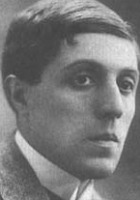Humbert Wolfe
Humbert Wolfe Poems
'There's someone at the door,' said gold candlestick:
'Let her in quick, let her in quick!'
'There is a small hand groping at the handle.
Why don't you turn it?' asked green candle.
...
Down some cold field in a world outspoken
the young men are walking together, slim and tall,
...
Suddenly he sang across the trenches,
vivid in the fleeting hush
as a star-shell through the smashed black branches,
a more than English thrush.
...
You cannot hope to bribe or twist
(thank God!) the British journalist.
But, seeing what the man will do
unbribed, there's no occasion to.
...
I will not write a poem for you,
because a poem, even the loveliest,
can only do what words can do -
stir the air, and dwindle, and be at rest.
...
Give me the wings, magician! So their tune
Mix with the silver trumpets of the Moon,
And, beyond music mounting, clean outrun
...
Humbert Wolfe Biography
Humbert Wolfe CB CBE, was an Italian-born English poet, man of letters and civil servant, from a Jewish family background, his father being a German Jew (Martin Wolff) and his mother an Italian Jew (Consuela, née Terraccini). He was one of the most popular authors of the 1920s. He is now remembered for his epigram: You cannot hope to bribe or twist, thank God! the British journalist. But, seeing what the man will do unbribed, there's no occasion to. He was also a translator of Heinrich Heine, Edmond Fleg (1874-1963)and Eugene Heltai. A Christian convert, he remained very aware of his Jewish heritage. His career was in the Civil Service, beginning in the Board of Trade and then in the Ministry of Labour. By 1940 he had a position of high responsibility. His work was recognised with a CBE and then a CB. Wolfe's verses have been set to music by a number of composers, including Gustav Holst in his 12 Humbert Wolfe Settings, Op. 48 (1929). He had a long-term affair with the novelist Pamela Frankau, while remaining married. He died on his 55th birthday.)
The Best Poem Of Humbert Wolfe
Green Candles
'There's someone at the door,' said gold candlestick:
'Let her in quick, let her in quick!'
'There is a small hand groping at the handle.
Why don't you turn it?' asked green candle.
'Don't go, don't go,' said the Hepplewhite chair,
'Lest you find a strange lady there.'
'Yes, stay where you are,' whispered the white wall:
'There is nobody there at all.'
'I know her little foot,' grey carpet said:
'Who but I should know her light tread?'
'She shall come in,' answered the open door,
'And not,' said the room, 'go out any more.'

This man is able to draw word pictures like few others. He also challenged the Nazis as early as 1933. He deserves to be read more and known more today.